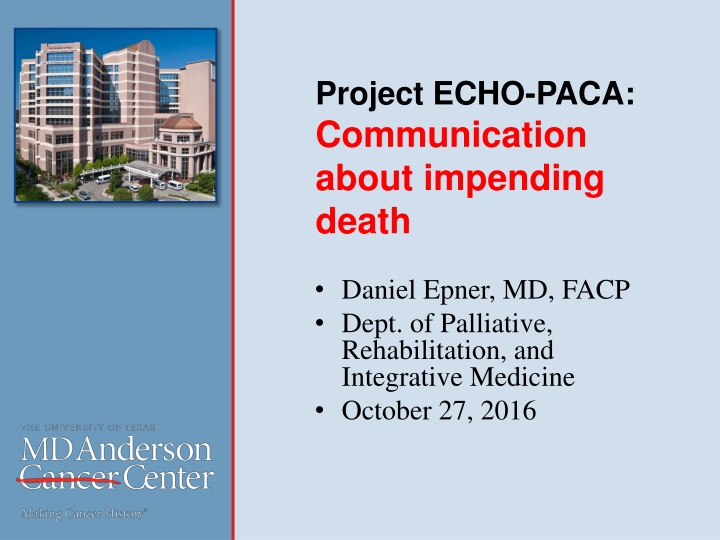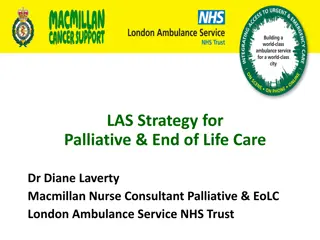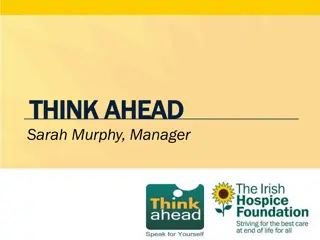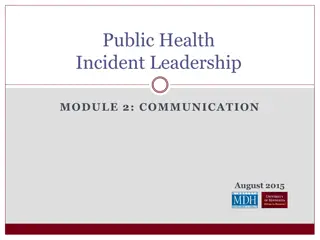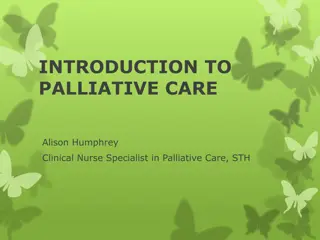Effective Communication in End-of-Life Care: Strategies and Challenges
This communication guide delves into challenging scenarios in discussing impending death, presenting SPIKES as a conceptual framework. A patient scenario of a woman with cervical cancer is explored, emphasizing the importance of assessing emotions and accepting reality. Strategies like the Ask-Tell-Ask skill are highlighted for addressing tough questions sensitively.
Download Presentation

Please find below an Image/Link to download the presentation.
The content on the website is provided AS IS for your information and personal use only. It may not be sold, licensed, or shared on other websites without obtaining consent from the author.If you encounter any issues during the download, it is possible that the publisher has removed the file from their server.
You are allowed to download the files provided on this website for personal or commercial use, subject to the condition that they are used lawfully. All files are the property of their respective owners.
The content on the website is provided AS IS for your information and personal use only. It may not be sold, licensed, or shared on other websites without obtaining consent from the author.
E N D
Presentation Transcript
Project ECHO-PACA: Communication about impending death Daniel Epner, MD, FACP Dept. of Palliative, Rehabilitation, and Integrative Medicine October 27, 2016
Goals Present a few challenging scenarios Discuss a specific clinical vignette Briefly discuss SPIKES , a conceptual framework for discussing any sensitive topic Present serious illness conversation guide
Most challenging aspects of end of life discussions Patient s adult son asks Please don t tell my mother Patient who is near death says I trust God will heal me. I will never give up. How long do I have? You mean you are just going to let him starve?!
Patient Scenario 38 year old woman with progressive stage 4 cervical cancer no longer responding to chemotherapy Married with 3 children: 4, 7, and 11 years old Bedridden with liver failure and shortness of breath related to extensive lung metastases I need to live for my children. My husband does not know how to cook or care for them, since he works as a truck driver and is gone frequently.
The first step: take stock of our emotions What can we fix, and what is unfixable? Fix what can be fixed. Do not try to fix the unfixable. Accepting reality is not the same as admitting defeat. We can only do our best Presence and genuine empathy are therapeutic
SPIKES Baile, The Oncologist 2000 Setting Perception Invitation Knowledge Empathy Summary
The Perception part of the SPIKES paradigm Ask first (or ask-tell-ask): Where do you think you are in your illness now? Tell me more . What is most important to you now? Whenever anyone asks a question that you do not know how to answer or throws you a curveball , ask for more information: Tell me more about what you mean.
Ask-tell-ask skill applied to the prognostic question How long do I have doc? I will give you facts and figures in a moment if you want, but first tell me more why you ask this question. Help me answer the best way possible. What is on your mind? Often people ultimately do not care about a time frame.
Prognostic question part 2 If patient does want a time estimate, answer with ranges: Hours to days Days to weeks Weeks to months Consider saying the following to set realistic expectations: We hope and pray for the longest and best possible life for your husband. However, as sick as he is, he could go suddenly at any time. Additional empathic response: As difficult as it is to consider the worst, I think we should be prepared.
NURSE Empathic Continuer Phrases Pollak, JCO 2007 Name Understand Respect Support Explore Bonus: I wish .
Name the emotion You seem sad. Tell me what s going on. This must be incredibly frustrating for you.
Understand the emotion I don t blame you for being anxious during radiation. That face mask would make anyone anxious. I don t blame you for being mad. I would be too if I had to wait so long to see your doctor.
Respect the emotion I respect your religious faith. That is strong medicine. I respect your fighting spirit. You have fought your illness bravely. I respect the love between you and your family.
Support the patient and family No matter what happens, we will be here for you. We will do the best we can for you.
Serious Illness Conversation Guide Bernacki, BMJ 2015 Check list approach Encourages patients to tell their stories Allows us to recommend a course of action rather than make an ultimatum.
